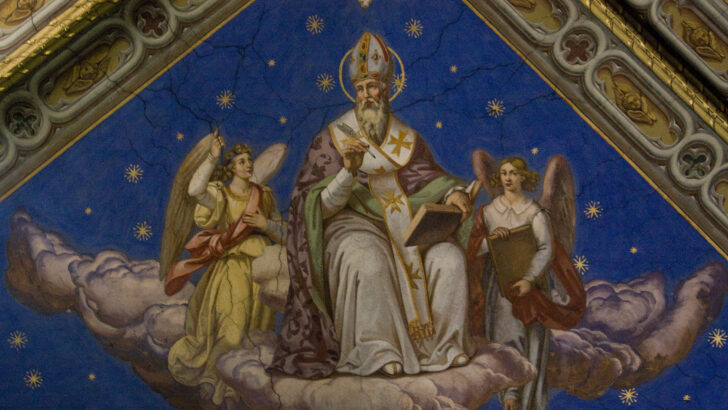St Ambrose of Milan, born in the 4th century into a prominent Roman family, is revered as one of the Church’s greatest saints and was declared a Doctor of the Church by Pope Boniface VIII in 1298. His life exemplifies faith, humility, and an extraordinary legacy of leadership and scholarship.
Raised in a household devoted to learning and faith, Ambrose’s upbringing prepared him for greatness. His father, a Roman governor, and his devout Christian mother ensured he received an excellent education in rhetoric, law, and literature in Rome, equipping him for a political career. A famous legend recounts that a swarm of bees settled on the infant Ambrose’s face, leaving behind a drop of honey – a sign, it was thought, of his future eloquence and distinction. Although raised as a catechumen, as was customary at the time, he was not baptised until adulthood.
By the age of thirty, Ambrose had become the Governor of Emilia-Liguria, overseeing an important region that included Milan. In 374, when the Arian bishop of Milan died, conflict erupted between Catholics and Arians. Ambrose, attempting to mediate, was unexpectedly acclaimed as the new bishop by both factions. Unbaptised and untrained in theology, he initially fled but was compelled to accept the role following Emperor Gratian’s approval. He was baptised, ordained, and consecrated in quick succession.
Embracing his episcopal office wholeheartedly, Ambrose devoted himself to theological study, mastering Catholic doctrine and Scripture. He popularised the practice of silently reading and meditating on the Bible, later known as lectio divina. Renowned for his eloquence in preaching, Ambrose attracted large crowds, living the faith he proclaimed by giving away most of his wealth to the poor and retaining only what was necessary to support his family.
Ambrose was a defender of orthodoxy, combating Arianism and uniting his diocese in the Nicene faith. His influence reached far beyond Milan, profoundly shaping the Church and inspiring individuals such as St Augustine of Hippo. Initially a follower of Manichaeism, Augustine was captivated by Ambrose’s wisdom and humility, leading to his eventual conversion. Augustine later praised Ambrose for guiding him to God, describing him with profound admiration.
Ambrose’s moral authority extended even to the Roman emperors. He persuaded Emperor Gratian to remove the pagan Altar of Victory from the Senate House and resisted Empress Justina’s demands to surrender a church to the Arians. His most famous confrontation occurred with Emperor Theodosius, whom he excommunicated for ordering a massacre in Thessalonica. The emperor, recognising his sin, submitted to public penance, a testament to Ambrose’s unwavering commitment to justice.
A prolific writer, Ambrose authored theological works, hymns, and letters on topics such as Christ’s divinity, ethics, and the Sacraments. He also made significant contributions to liturgy and was deeply devoted to the Virgin Mary.
St Ambrose’s life is a model of faith and leadership. The saint embraced God’s will with humility and courage, even when it diverges from our own plans.


 Renata Milán Morales
Renata Milán Morales St Ambrose of Milan in detail from the ceiling of Santa Maria sopra Minerva in Rome. Photo: https://www.flickr.com/photos/paullew/
St Ambrose of Milan in detail from the ceiling of Santa Maria sopra Minerva in Rome. Photo: https://www.flickr.com/photos/paullew/ 